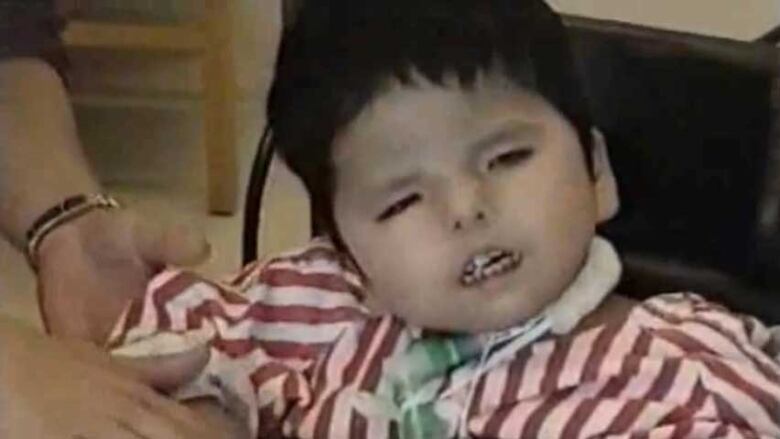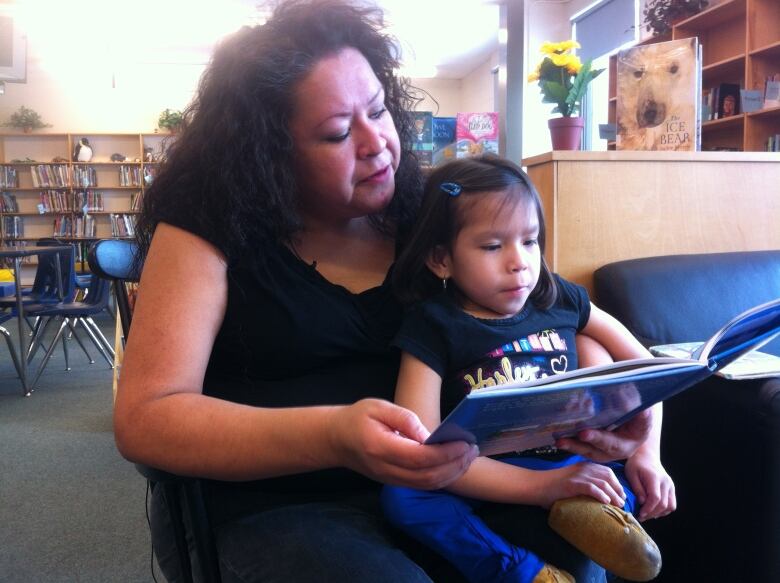First Nations children still face delays in accessing health care: report
Governments' response to Jordan's Principle falls short, researchers and groups say
First Nations children in Canada stillface obstaclesin accessing health and social services as quickly as other children due to continuing "bureaucratic confusion" and red tape on the part of governments, according to a new report.
The report, released on Tuesday by Canadian and U.S. researchers along with the Canadian Pediatric Society, the Assembly of First Nations andUnicefCanada, says the federal governmenthas fallen short on Jordan's Principle,its 2007 pledge to ensure First Nations children with complex health needswho are caughtin jurisdictional fights between the federal, provincial and band governmentsare not denied accessto public health services.

However, the report's authors say, First Nations children needing health and social services must still contend with what it callsan "ongoing inequity," asthey cannot access the care and support they need as quickly as other children in Canada.
"There is growing recognition that the governmental response to Jordans Principle does not reflect the vision advanced by First Nations and endorsed by the House of Commons," the report states in part.
The report was prepared by researchers from McGill University, the University of Manitoba and the University of Michigan, in collaboration with representatives from the three organizations.
Agreement named after Manitoba boy
Jordan's Principle got its name from Jordan River Anderson, a young boy from the Norway House Cree Nation in northern Manitoba who was born with a complex genetic disorder that required specialized care.
After spending much of his life in a hospital setting, doctors decided he could return to Norway House, but would need an enormous amount of home care.
The Manitoba and federal governments fought over who shouldpay for that care. The issue was never resolved, and Jordan, 4, died in 2005 in a Winnipeg hospital, hundreds of kilometres away from his family's community.
"Responsibility for services to First Nations children is often shared by federal, provincial/territorial and First Nations governments; in contrast, funding and delivery of these same services to most other children in Canada falls solely under provincial/territorial jurisdiction," the report says.
"Accordingly, First Nations children face unique challenges in accessing services, and Jordans Principle is an essential mechanism for ensuring their human, constitutional, and treaty rights."
After Jordan's Principle was endorsed by the House of Commons, the federal government helped develop federal, provincial and territorial policies and procedures for identifying similar cases and dealing with jurisdictional disputes.
Range of cases narrowed
But the new report says the current federal, provincial and territorial governments' response has narrowed the range of cases to which the principle would apply, and delayed payment for services tied up in jurisdictional disputes.
"Now it's been pruned back to a definition where there is no Jordan's Principle case unless the federal government and the province agree that there is a case," said Jose Lavoie, director of the Manitoba First Nations Centre for Aboriginal Health Researchand one of the researchers involved in the report.

Unicef Canada, the Canadian Pediatric Society and the Assembly of First Nations are calling on the governments to work with First Nations to "develop and implement a response for First Nations children that truly reflects the vision of Jordan's Principle."
The groups also want the governments to "systematically identify and address the jurisdictional ambiguities and underfunding that give rise to each Jordans Principle case."
A spokesperson for federal Aboriginal Affairs and Northern Development Minister Bernard Valcourt told CBC News that Ottawa has reached agreements to implement Jordan's Principlewith Manitoba, Saskatchewan, British Columbia and New Brunswick.
"These arrangements outline commitments to developing dispute avoidance processes to ensure continuity of care for children with multiple disabilities. All other provinces already have mechanisms in place to implement Jordans Principle," the spokesperson wrote in an email.
"While there are currently no outstanding jurisdictional disputes involving Jordan's Principle in Canada, we believe that the best way to ensure First Nation children and families get the support they need is by working with willing partners and continue engaging with provinces, territories and First Nations to collaborate on implementing Jordan's Principle."
'These kids are being left out'
ElizabethBignellsays she and her daughter,N'TanisGeorge, 7, moved to Winnipeg last summersoN'Taniscould get the medical care she needs.
"I just want her to shine,"Bignellsaid. "I want her to have every opportunity as other children do."
N'Taniswas born with caudal regression syndrome, which impairs the development of the lower half of her body. The condition has come with other medical problems for her.
Bignell saidN'Taniscould not get the care she needed in theirhome community, theOpaskwayakCree Nation in northern Manitoba, because their band does not receive the same federal health funding as other communities.
"A few times I was denied any kind of services only because of where she lives," she said, adding thatN'Tanisneeds access to specialized services not offered in their closest community, The Pas.
Cindy Blackstock, executive director of the First Nation Child & Family Caring Society of Canada, calls the results of the latestresearch tragic.
"We've seen internal government documents that also confirm that inside of the government, they know that these kids are being left out, and sometimes with very tragic consequences," she told CBC News.
Blackstock said her organization hasa case before the Canadian Human Rights Commission asking Ottawa to broaden its criteria in Jordan's Principle cases. A ruling in that case is expected later this year.
Ontario's provincial advocate for children and youth, Irwin Elman, says he supports the new report and wants governments to take action.
"I am urging the provincial and federal governments to uphold their commitment to First Nations children and begin the hard work needed to transform existing programs and services for First Nations children and implement Jordan's Principle," Elman said in a news release.
Read the full report
Below you can read the full report, Without Denial, Delay or Disruption: Ensuring First Nations children's access to equitable services through Jordan's Principle.
- ON MOBILE? Read the report here.













_(720p).jpg)


 OFFICIAL HD MUSIC VIDEO.jpg)
.jpg)



























































































